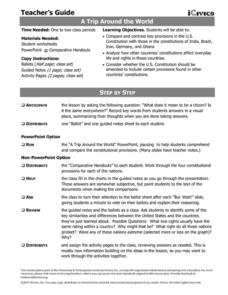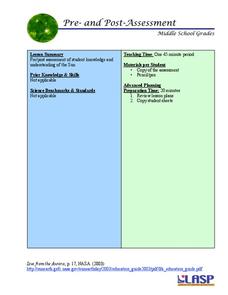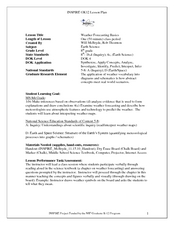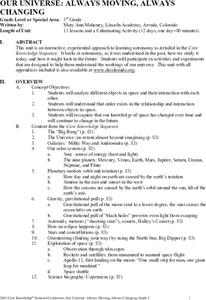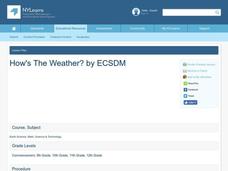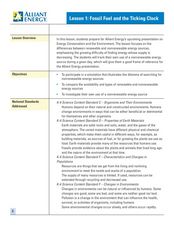Curated OER
Preventing Water Pollution
Fourth graders write at least two ways to clean the water and two ways to prevent pollution with appropriate guesses, striving not to create any more pollution in the water. They understand how pollution affects water as well as the rest...
Curated OER
Solar System Fun Facts
Students read facts about the Solar System. In this solar system lesson plan, students read facts on the dimensions, planets, and workings of the solar system. There is a big emphasis on Saturn.
Curated OER
The Phases of the Moon
Students view an applet to study the phases of the Moon in relation to the orientation of the sun, moon, and Earth.
Curated OER
Recycle
Students determine the weight of paper waste generated by the class. They brainstorm ways to reduce and recycle. They make their own paper to demonstrate recycling. This lesson is very effective in demonstrating how recycling works.
Curated OER
A Trip Around the World
Students role play the role of a travel agent. In groups, they must plan a trip around the world making stops in a different biome. They use the internet to discover the characteristics of each biome and create a travel brochure for...
Curated OER
Tide Types
Students record hourly reading for water height for 24 hours and determine whether a location experiences diurnal, semi-diurnal or mixed tides. Links are present for the information. Students predict high and low tide, and answer a set...
Curated OER
Cloud Observations using GLOBE Protocols
Students observe which of ten types of clouds are visible and how much of the sky is cloud covered. They see that by observing clouds, we can get information about temperature, moisture, and wind conditions in different places in the...
PHET
The Sun: Pre- and Post-Assessment
Want to see how far pupils have come since the beginning of the unit? This activity is designed to be a pre- and post-assessment for a unit on the Sun. The first in a series of 18 that can be combined to form a complete unit. Two...
Curated OER
Weather Analysis - Lab Activity
Ninth graders perform research in the subject of weather to answer several key questions to increase comprehension of concepts. Students use weather prediction as an application for the research.
Curated OER
What's Up With the Water Cycle?
Students explore the water cycle. Students identify the stages in a water cycle and create a PowerPoint presentation based on their knowledge.
Curated OER
Recycling: Problem solved or problem ongoing?
Students research on the Web, magazines, and newspapers the extent of waste and recycling situation has been solved. They focus on the community, get facts and figures to show how recycling goes on there.
Curated OER
CO2 and Air Pollution
Seventh graders observe and test for the presence of carbon dioxide gas. They compare concentrations of carbon dioxide gas and conclude high concentrations of carbon dioxide gas are unhealthy for human beings.
Curated OER
Geology and it’s Influence
Middle schoolers compare current geological map and the one from 1800's. In this earth science lesson, students discuss differences between the two and explain the factors that caused the change. They write an essay about how these...
Curated OER
Weather Forecasting Basics
Eighth graders analyze weather diagrams and weather maps. In this earth science instructional activity, 8th graders explain why it is important to know the weather. They complete a handout at the end of the instructional activity.
Curated OER
Moon Observations
Students study the science of the moon. In this moon observations lesson plan, students study vocabulary associated with the moon, study a lunar calendar, and a phases of the moon's orbit around the Earth.
Curated OER
Our Universe: Always Moving, Always Changing
Students explore the main concepts of astronomy through the eleven lessons of this unit. The past, present, and future methods of studying the science are examined in this unit.
Curated OER
Seasons of the Year
Students examine how the link between the tilt of the Earth's axis to the ecliptic and seasons of the year--length of day, effectiveness of sunlight, polar day and night, and seasons south and north of the equator, as well as near it.
Curated OER
How's the Weather?
Students explore earth science by researching the Internet. In this weather pattern lesson plan, students utilize the website weather.com to analyze the weather in different geographic locations. Students view charts and graphs based on...
Curated OER
Fossil Fuel and the Ticking Clock
Learners study energy sources to learn about fossil fuels and environmental concerns. In this energy sources lesson, students watch demonstrations for various energy examples. Learners find hidden pennies, make a bar graph on their data,...
Curated OER
What's Crackin' Under New Zealand
Students construct a model of the Earth using clay and oranges. In this earth science lesson, students explain the causes of earthquakes and volcanic activity. They write their findings in their science journal.
Curated OER
Studying Shadows
Young scholars measure shadows and explore the altitude of the sun. In this sun lesson students will graph the length of shadows and solar altitude against time.
Curated OER
Water, Water Everywhere, and Nary a Drop to Drink!
Students sing the continent song and locate oceans between the continents on a map. They read "They Earth is Mostly Ocean" and copy notes into their journals. They watch a demonstration of water and saltwater evaporated to see what is...
Curated OER
Name that Natural Resource
Students discuss natural resources. In this science lesson, students understand that physical properties can be used to identify minerals and complete the chart each day working alone or in a small group.
Curated OER
Graphing San Diego Tides
Students observe the tides in San Diego for one month. Using this information, they graph the tides on a chart along with the phases of the moon. They answer questions related to the graph to end the lesson.






